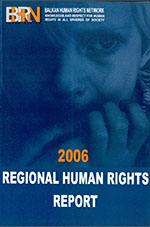Human Rights in Montenegro in 2006
Human Rights in Montenegro in 2006
Author(s): Siniša Bjeković, Nenad KoprivicaSubject(s): Law, Constitution, Jurisprudence
Published by: Balkan Human Rights Network
Summary/Abstract: This text represents a brief analysis of the situation concerning human rights in Montenegro in 2006. The introduction includes a general context and social situation in Montenegro, which represents a social base for respect and protection of human rights. Although it's not possible to speak about a level of promotion and protection of human rights as it was during the last decade of the previous century, it is to say that transitional period still entails all the characteristics of the society that undergoes the revival of institutions and general social, cultural and legal reform. That inevitably includes a need to focus on the institutional and legal reforms of the human rights system as well as on a change of mstitutional involvement and social awareness in comprehension of human rights. Having acquired its independence Montenegro has particularly emphasized the obligation of maintaining the attained level of respect and protection of human rights as well as their improvement in a new state legal framework, which is included in the inaugural legal and political acts following the constitution of a new state. The major obstacle in internal implementation is the absence of constitution, which causes many deficiencies in protection of human rights on the institutional level as well as in regard to process legal norms in the procedure before the government bodies. The following problem includes rigid and anachronous legislation in some social fields such as religion freedom, protection of personal data, etc. The existing legislation in Montenegro mainly provides legal foundation, however in practical meaning it has neither found a proper base for more complete implementation of standards in the field of human rights nor are those being implemented in compliance with the accepted obligations (example of judicial institutions and implementation of European law). The system of security and protection of fundamental human values (life and body) still burdens the society by a number of unsolved cases of violence over some public persons while the justice is undergoing some major reforms in organizational and structural flied. Debates on the new constitution prove clear ambitions for higher degree of independence of courts, in particular in the field of protection from political influence in election of judges and in financing of courts. On the other hand, there are many activities regarding education and training in judicial bodies and in management of old cases, which burden the deadlines for prompt case management that is a right to a trial within reasonable time. According to estimations of many non-governmental organizations in Montenegro, a particular problem includes a strong influence of entrepreneurial lobbies that influence decision making in some vital development cases.
Journal: Regional Human Rights Report
- Issue Year: 2006
- Issue No: 01
- Page Range: 184-209
- Page Count: 26
- Language: English

